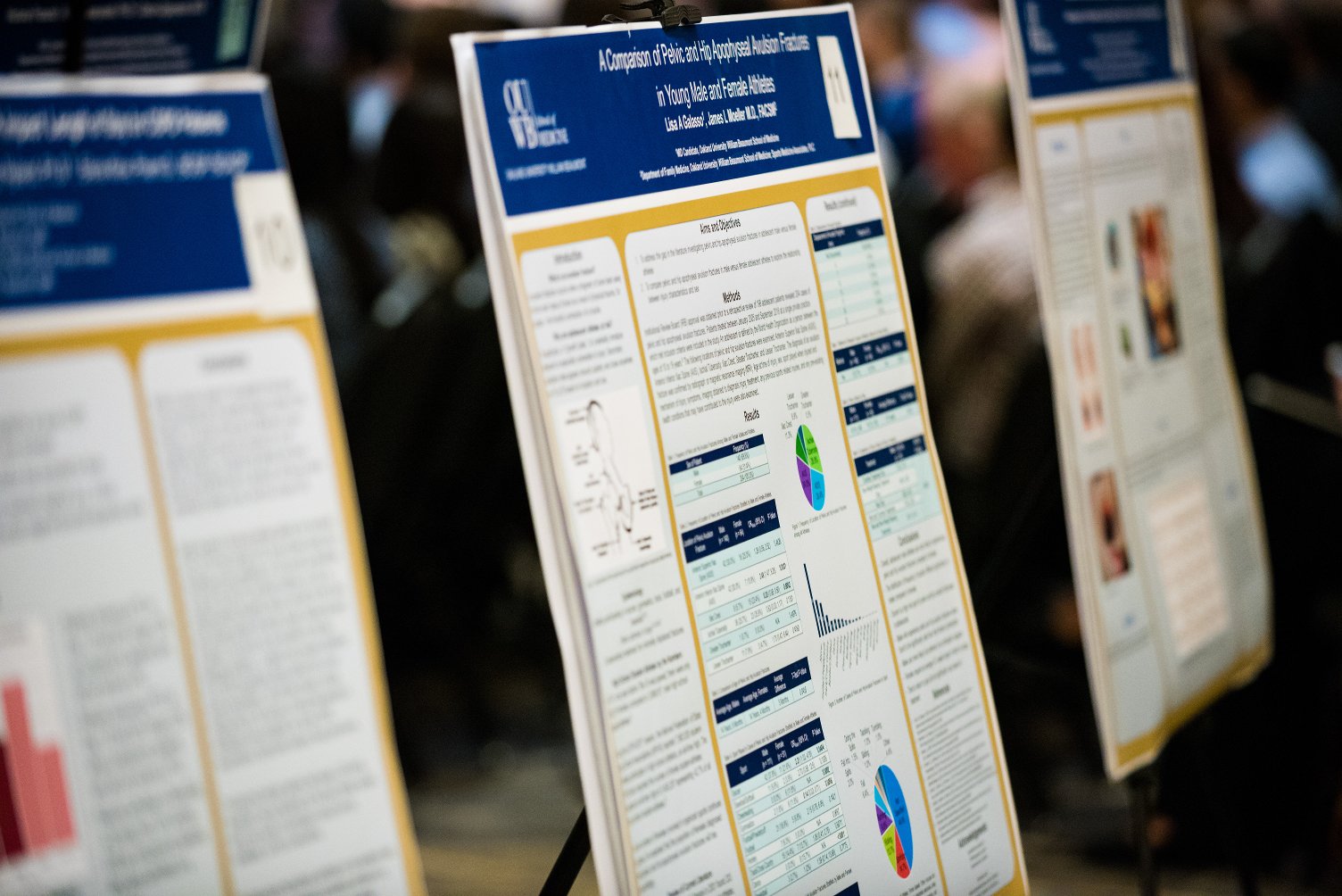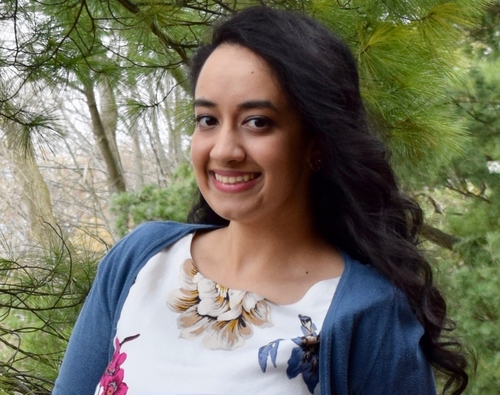
Research work done by Oakland University William Beaumont School of Medicine’s Class of 2020 during the last four years is expected to have a broad impact on the field of medicine — well beyond graduation.
That’s according to Dwayne Baxa, Ph.D., assistant professor of microbiology, Department of Foundational Medical Studies, and one of the directors of the school’s Embark program.
Embark is a required scholarly concentration program at OUWB that provides a mentored introduction to research and scholarship. The four-year longitudinal curriculum consists of structured coursework in research design and implementation, compliance training, research communication, and scholarly presentation, with protected time to develop mentored projects in a wide-range of community and health-related settings.
Typically, projects are presented on the eve of Match Day at an event called Embark Capstone Colloquium. Baxa said that the fact that this year’s version was cancelled as a result of COVID-19 shouldn’t take away from the work done by OUWB’s Class of 2020.
“Our 2020 students were very productive with their Embark projects right until graduation,” said Baxa.
“Each year we see the students accomplishing more and more with their projects and this class is no exception.”
Baxa said that as a cohort, the class has been represented at 59 presentations at national and international meetings, 52 presentations at conferences within Michigan and the Detroit area, had 12 manuscripts either submitted or published in reputable scientific journals, and won nine awards and commendations.
Clinical and laboratory research were among the types of work done, along with global and community health, health systems, and medical education research.
“Several students have reported to us that their Embark experience was a notable part of their residency interview conversations,” said Baxa. “We are certain this class will go on to accomplish great things in their professional lives.”
Embark Capstone Project Presentations
Included in the list of Embark projects completed by the graduating class are two selected for presentation on stage before a seated audience at the colloquium (the majority of work is presented on posters to attendees).
Kara Sawarynski, associate professor and vice chair, Department of Foundational Medical Studies, is another of the four Embark program directors. (The other two directors are Kyeorda Kemp, Ph.D., assistant professor in the Department of Foundational Medical Studies, and Victoria Roach, Ph.D., assistant professor of Anatomy in the Department of Foundational Medical Studies )
Sawarynski said the two presentations selected are based on a faculty review of scholarly activity (including publications and presentations) with regard to all the Embark projects.
For 2020, the two students selected to present on stage were Justin Yuan and Sophia Khalil.
Yuan’s project was “Stereotactic Radiosurgery as a Component of Treatment for Brain Metastases in Small Cell Lung Cancer Patients.”
Khalil’s project was “Assessing Medical Residents’ Cultural Competence in Managing Diabetes for Patients Observing Ramadan.”
‘Such a tangible impact’
Khalil | |
Khalil |
Sawarynski said Khalil’s work is an example of the “exceptional scholarly activity” OUWB medical students pursue throughout their four years at the school.
Khalil said her interest in chronic disease management in minority populations (specifically immigrant populations) began while she was pursuing her master’s degree at Johns Hopkins School of Public Health.
Her thesis project at the time explored cardiovascular health in south Asian immigrant populations.
“Upon entering medical school, taking the things I had learned during my thesis project about health literacy and the unique risks that come from being an immigrant/minority population, I knew I wanted my Embark project to explore this further,” said Khalil.
As she dove into the project, Khalil said she quickly realized that plenty of information exists for diabetic patients who fast for Ramadan, but very little is geared toward providers with regard to counseling patients.
“Literature showed that most physicians agreed that patients should come to their health care providers for counseling prior to Ramadan to help adjust medication/diet/exercise plans,” said Khalil. “But, it also showed that there was an information gap…the physicians self-reported not having the proper knowledge to counsel patients. They concluded that an educational intervention would be beneficial in bolstering cultural competency.”
Khalil said the most valuable lesson she took away from the project is the impact such work can have on a community.
For example, the project lead to the creation of Beaumont-branded pamphlets that were distributed to Beaumont clinics for reference during the period leading up to and during Ramadan.
“When I started the project, I never thought it would go beyond being another school assignment; I never thought it would have such a tangible impact,” she said.
Embark Competitive Scholarship Award Recipients
In addition to the presentations, several Class of 2020 students received scholarships from generous OUWB donors in their M3 year to apply toward their research in their M4 year. These students participated in the mini-manuscript competition and were awarded for their exceptional manuscript submissions.
The list of awards and recipients are as follows:
Ann V. Nicholson Embark Program Manuscript of the Year Award
Recipient: Moses Evbuomwan
Factors that Influence Students' Willingness to Consent and Submit Their DNA for Medical Research: A Cross Sectional Study of Oakland University Students
Mentor: Inaya Hajj Hussein, Ph.D.
Newman Family Foundation Embark Program Competitive Scholarship Award
Recipient: Prachi Shah
Assessing Cultural Competence of Physicians in Diabetes Management during Ramadan
Mentor: Asha Shajahn, M.D.
Ravitz Foundation Embark Program Competitive Scholarship Award
Recipient: Allyson DiMagno
Chronic Kidney Disease Impact on Total Joint Arthroplasty Outcomes
Mentor: Inaya Hajj Hussein, Ph.D.
Ravitz Foundation Embark Program Competitive Scholarship Award
Recipient: Diana Jomaa
Submission Title: The Effect of Enhanced Recovery After Surgery (ERAS) on Outcomes Following Colorectal Surgery
Mentor: Harry Wasvary, M.D.
Ravitz Foundation Embark Program Competitive Scholarship Award
Recipient: Md Saon
Performance of CT Colonography and Impact of Extracolonic Findings
Mentor: Sayf Al-Katib, M.D.
Ravitz Foundation Embark Program Competitive Scholarship Award
Recipient: Alison Thomas
Anatomical Considerations of the Recurrent Laryngeal Nerve and its Vulnerability during Surgical Procedures of the Neck
Mentor: Jickssa Gemechu, Ph.D.
Ravitz Foundation Embark Program Competitive Scholarship Award
Recipient: Justin Yuan
The Role of Stereotactic Radiosurgery in Treatment for Brain Metastases from Small Cell Lung Cancer
Mentor: Inga Grills, M.D.
Embark Presentation Dean’s Award Recipients – Funded by OU Credit Union
Embark Program Oral Presentation Dean’s Choice Award 1st Place
Recipient: David Weinfeld
Examining Color Vision Deficient Medical Students' Performances and Attitudes in Histology
Mentor: Stefanie Attardi, Ph.D.
Embark Program Oral Presentation Dean’s Choice Award 2nd Place
Recipient: Justin Yuan
Stereotactic Radiosurgery as a Component of Treatment for Brain Metastases in Small Cell Lung Cancer Patients
Mentor: Inga Grills, M.D.
Embark Program Oral Presentation Dean’s Choice Award 3rd Place
Recipient: Nicholas Kondoleon
Do Inhaled Anesthetics Accelerate the Progression of Parkinson Disease?
Mentor: Dwayne Baxa, Ph.D.
For more information, contact Andrew Dietderich, marketing writer, OUWB, at adietderich@oakland.edu.
Follow OUWB on Facebook, Twitter, and Instagram.
NOTICE: Except where otherwise noted, all articles are published under a Creative Commons Attribution 3.0 license. You are free to copy, distribute, adapt, transmit, or make commercial use of this work as long as you attribute Oakland University William Beaumont School of Medicine as the original creator and include a link to this article.


